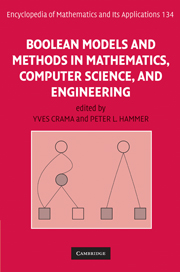Book contents
- Frontmatter
- Contents
- Preface
- Introduction
- Acknowledgments
- Contributors
- Acronyms and Abbreviations
- Boolean Models and Methods in Mathematics, Computer Science, and Engineering
- Part I Algebraic Structures
- Part II Logic
- 3 Proof Theory
- 4 Probabilistic Analysis of Satisfiability Algorithms
- 5 Optimization Methods in Logic
- Part III Learning Theory and Cryptography
- Part IV Graph Representations and Efficient Computation Models
- Part IV Applications in Engineering
3 - Proof Theory
from Part II - Logic
Published online by Cambridge University Press: 05 June 2013
- Frontmatter
- Contents
- Preface
- Introduction
- Acknowledgments
- Contributors
- Acronyms and Abbreviations
- Boolean Models and Methods in Mathematics, Computer Science, and Engineering
- Part I Algebraic Structures
- Part II Logic
- 3 Proof Theory
- 4 Probabilistic Analysis of Satisfiability Algorithms
- 5 Optimization Methods in Logic
- Part III Learning Theory and Cryptography
- Part IV Graph Representations and Efficient Computation Models
- Part IV Applications in Engineering
Summary
Introduction
The literature contains a wide variety of proof systems for propositional logic. In this chapter, we outline the more important of such proof systems, beginning with an equational calculus, then describing a traditional axiomatic proof system in the style of Frege and Hilbert.We also describe the systems of sequent calculus and resolution that have played an important part in proof theory and automated theorem proving. The chapter concludes with a discussion of the problem of the complexity of propositional proofs, an important area in recent logical investigations. In the last section,we give a proof that any consensus proof of the pigeonhole formulas has exponential length.
An Equational Calculus
The earliest proof systems for propositional logic belong to the tradition of algebraic logic and represent proofs as sequences of equations between Boolean expressions. The proof systems of Boole, Venn, and Schröder are all of this type. In this section, we present such a system, and prove its completeness, by showing that all valid equations between Boolean expressions can be deduced formally.
We start from the concept of Boolean expression defined in Chapter 1 of the monograph Crama and Hammer [9]. If ϕ and ψ are Boolean expressions, then we write ϕ[ψ/xi] for the expression resulting from ϕ by substituting ψ for all occurrences of the variable xi in ϕ. With this notational convention, we can state the formal rules for deduction in our equational calculus.
Information
- Type
- Chapter
- Information
- Publisher: Cambridge University PressPrint publication year: 2010
